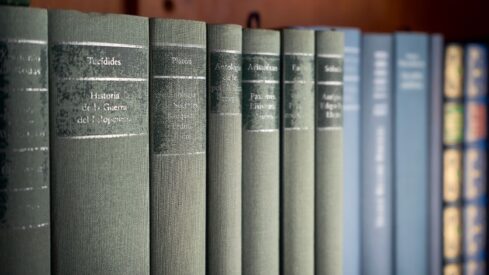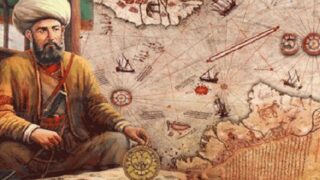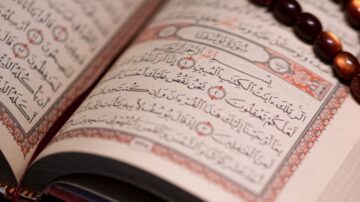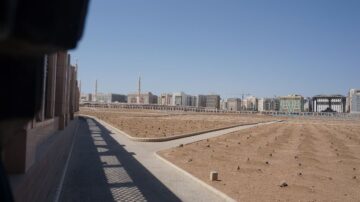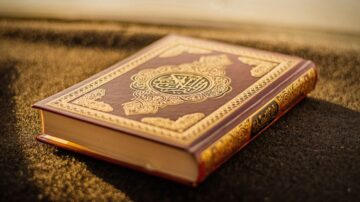Abu Nasr Mohammad Ibn al-Farakh Al-Farabi was born to a noble family in the small village of Wasij, in the province of Farab in Turkestan, in 872 AD (259 AH). His works included several rich commentaries on Aristotle’s physics, meteorology, and logic – in addition to a large number of books on several other subjects embodying his original contributions. As a result, he was called the “Second Teacher” (al-Mou’allim al-Thani) – with Aristotle being the “First”.
Al-Farabi had a great desire to understand the universe and humankind, and to understand the latter’s place within the former, so as to ascertain a comprehensive and intellectual picture of the world and of society as a whole. When he undertook his meticulous study of ancient philosophy, particularly of Plato and Aristotle, he absorbed the components of Platonic and Neo-Platonic philosophy, which he then integrated into his knowledge of the Qur’an and the various sciences derived from it.
However, he combined these two in a new and unique way: He was the first Islamic philosopher to separate philosophy and theology, influencing the scholars of many different religions who followed him. He concluded that human reason – the tool of the philosopher, was superior to revelation – the tool of religion, resulting in the advantage of philosophy over religion. He claimed that philosophy was based on intellectual perception, while religion was based on imagination. He thus attributed impressive characteristics to the philosopher, and advocated the philosopher as the ideal head of state. He blamed political upheavals in the Islamic world on the fact that the state was not run by philosophers, whose superior powers of reason and intellect would result in ideal leadership.
Al-Farabi’s psychological view of humanity was that an isolated individual cannot achieve perfection by himself, but requires the aid of many other individuals. Therefore, to achieve any sort of perfection, every person needed to interact and associate with others. In terms of political thought, Al-Farabi described the ideal state as a Muslim one, which had the duty was to provide for the physical well-being of the citizens, as well as helping people towards religious salvation. According to Al-Farabi, the best ruler for this Muslim states would be a “philosopher-king”, a concept described in Plato’s Republic. Al- Farabi’s ideal rulers would be chosen for their intelligence and carefully educated in science, philosophy and religion.
One of the most important contributions of Farabi, beyond his political views and scientific philosophies, was to make the study of logic easier by dividing it into two categories – Takhayyul (idea) and Thubut (proof). He wrote several sociological books, including his famous work – Ara Ahl al-Madina al-Fadila (The Model City). His books on psychology and metaphysics were largely based on his own work.
Al-Farabi also wrote a book on music, called Kitab al-Musiqa (the Book of Music). He was an expert in art and the science of music and invented several musical instruments, besides contributing to what we now know as “musical notes”. It has been reported that he could play his instrument so well that he could make people laugh or weep at will – depending on the piece. In physics he demonstrated the existence of void.
Although many of his books have been lost, we still know of 117 of them, which include 43 on logic, 11 on metaphysics, seven on ethics, seven about political science, 17 are on music, medicine and sociology, and 11 of which are commentaries. Some of his more famous books include the book Fusus al-Hikam, which remained a textbook of philosophy for several centuries at various centers of learning and is still taught at some of the institutions in the East. The book Kitab al-lhsa al ‘Ulum discusses classification and fundamental principles of science in a unique and useful manner. The book Ara Ahl al-Madina al- Fadila is a significant early contribution to sociology and political science.
His interests in philosophy, science and politics were greatly influenced by his teachers and travel. Al-Farabi’s father was of Persian origin and was an army commander in the Turkish court. He migrated to Turkestan after being named general. Al-Farabi later moved to Baghdad, where he studied grammar, logic, philosophy, music, mathematics and sciences. There, he was a pupil of the great translator and interpreter of Greek philosophy, Abu Bishr Matta bin Yunus. Al-Farabi then studied under Yuhanna bin Haylan in Harran. During this period, he acquired mastery over several languages – as well as various branches of knowledge and technology. His translations of ancient Greek works mean that he was among the earliest Islamic philosophers to encounter and then introduce Greek philosophy to the Islamic world He lived through the reign of six Abbasid Caliphs. As a philosopher and scientist, he acquired great proficiency in various branches of learning.
Farabi traveled to many distant lands and studied for some time in Damascus and Egypt, but repeatedly came back to Baghdad, until he visited Saif al-Daula’s court in Halab (Aleppo). He became one of the constant companions of the king, and it was here at Aleppo that his fame spread far and wide. During his early years he was a qadi (judge), but later on he took up teaching as his profession. During the course of his career, he suffered great hardships and at one time was the caretaker of a garden. He died a bachelor in Damascus in 339 A.H./950 CE at the age of 80.
Al-Farabi’s work greatly influenced the Islamic philosophers who followed him, particularly Ibn Sina and Ibn Rushd, and for several centuries thereafter. He also sparked what would become an ongoing debate between representatives of philosophy and theology, as Islamic thinkers sought to reconcile disparities between the two fields.
By David W. Tschanz


